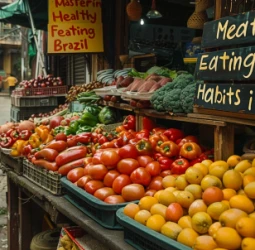Veganism has been steadily gaining popularity all around the world, with more and more people realizing the benefits of a plant-based diet. Brazil, being the largest country in South America, is no exception to this trend. In recent years, the adoption of a vegan diet in Brazil has seen a significant increase, with the country being labeled as one of the top vegan-friendly destinations in the world. This article will explore the reasons behind this shift towards a vegan lifestyle in Brazil, as well as the impact it has had on the country's food industry and culture.
The term "vegan" was first coined in 1944 by Donald Watson, and it refers to individuals who do not consume any animal products, including meat, dairy, eggs, and honey. In Brazil, the concept of vegetarianism has been around for decades, but it wasn't until the 2000s that veganism started to gain traction. This can be attributed to the rise of social media and the internet, which has made information on veganism easily accessible to the masses. As a result, more and more Brazilians are becoming aware of the ethical, environmental, and health implications of consuming animal products.
One of the main reasons behind the increase in the popularity of a vegan diet in Brazil is the country's deep-rooted history in agriculture and livestock farming. With the meat industry being a significant contributor to Brazil's economy, there is growing concern over the impact of animal farming on the environment. In response to this, a growing number of Brazilians are turning to a plant-based diet as a way to reduce their carbon footprint and promote sustainability.
Another factor contributing to the rise of veganism in Brazil is the country's diverse cuisine. With a variety of fruits, vegetables, and grains available, it is relatively easy for Brazilians to adopt a vegan diet without compromising on flavor and taste. Many local restaurants and cafes have also started to offer vegan options on their menus, catering to the increasing demand for plant-based meals.
The impact of the vegan trend in Brazil can also be seen in the country's food industry. Many plant-based companies and startups have emerged, offering a wide range of vegan products, from meat substitutes to dairy alternatives. The demand for these products has also encouraged traditional food companies to develop their own vegan products, making it easier for people to make the switch to a vegan diet.
Moreover, the rise of veganism in Brazil has also sparked a cultural shift in the country. It has brought awareness to the treatment of animals and their rights, promoting a more compassionate and ethical way of living. This has led to a growing number of animal sanctuaries and vegan events and festivals being organized across the country, further promoting the vegan lifestyle.
In conclusion, the adoption of a vegan diet in Brazil is not just a passing trend, but a conscious decision made by individuals to create a more sustainable and compassionate world. With the country's rich cultural heritage, abundance of plant-based options, and the growing awareness of the impact of animal-based industries, it is no surprise that veganism has taken root in Brazil. The country's growing vegan community and the impact it has had on the food industry and culture is a testament to the power of this lifestyle. As more people continue to embrace a vegan diet, Brazil is well on its way to becoming a leading force in the global vegan movement.
The term "vegan" was first coined in 1944 by Donald Watson, and it refers to individuals who do not consume any animal products, including meat, dairy, eggs, and honey. In Brazil, the concept of vegetarianism has been around for decades, but it wasn't until the 2000s that veganism started to gain traction. This can be attributed to the rise of social media and the internet, which has made information on veganism easily accessible to the masses. As a result, more and more Brazilians are becoming aware of the ethical, environmental, and health implications of consuming animal products.
One of the main reasons behind the increase in the popularity of a vegan diet in Brazil is the country's deep-rooted history in agriculture and livestock farming. With the meat industry being a significant contributor to Brazil's economy, there is growing concern over the impact of animal farming on the environment. In response to this, a growing number of Brazilians are turning to a plant-based diet as a way to reduce their carbon footprint and promote sustainability.
Another factor contributing to the rise of veganism in Brazil is the country's diverse cuisine. With a variety of fruits, vegetables, and grains available, it is relatively easy for Brazilians to adopt a vegan diet without compromising on flavor and taste. Many local restaurants and cafes have also started to offer vegan options on their menus, catering to the increasing demand for plant-based meals.
The impact of the vegan trend in Brazil can also be seen in the country's food industry. Many plant-based companies and startups have emerged, offering a wide range of vegan products, from meat substitutes to dairy alternatives. The demand for these products has also encouraged traditional food companies to develop their own vegan products, making it easier for people to make the switch to a vegan diet.
Moreover, the rise of veganism in Brazil has also sparked a cultural shift in the country. It has brought awareness to the treatment of animals and their rights, promoting a more compassionate and ethical way of living. This has led to a growing number of animal sanctuaries and vegan events and festivals being organized across the country, further promoting the vegan lifestyle.
In conclusion, the adoption of a vegan diet in Brazil is not just a passing trend, but a conscious decision made by individuals to create a more sustainable and compassionate world. With the country's rich cultural heritage, abundance of plant-based options, and the growing awareness of the impact of animal-based industries, it is no surprise that veganism has taken root in Brazil. The country's growing vegan community and the impact it has had on the food industry and culture is a testament to the power of this lifestyle. As more people continue to embrace a vegan diet, Brazil is well on its way to becoming a leading force in the global vegan movement.



 admin
admin















